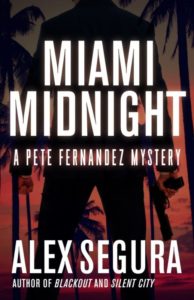Jazz and noir go hand in hand, like two ingredients meant to be savored together—like chocolate and peanut butter. Jazz lore is littered with tragic figures, spiraling addicts, and fringe criminals and con artists. The musical genre’s varied styles, whether it’s melancholy cool jazz or the more rhythmic and manic bebop, make for the perfect soundtrack to a good, bloody crime novel.
My latest Pete Fernandez Mystery, the series finale Miami Midnight, finds my battered PI on the hunt for clues surrounding the death of Javier Mujica, a troubled jazz pianist gunned down outside of a local music venue. Pulling details from the lives of real-world jazz characters like Bill Evans and Lennie Tristano, with a dash of Miami flair, Mujica’s story provide a sinister backdrop to the novel, and creates a haunting soundtrack to Pete’s investigation. But it’s not the first—nor will it be the last—crime novel loaded with jazz references and nods to past masters. Here’s a rundown of a few of my favorites.
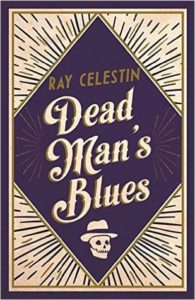
Dead Man’s Blues, Ray Celestin
Chicago in the late 20s, Pinkerton detectives, a dead heiress, and gangsters galore—Ray Celestin’s moody sequel to The Axeman tells a sweltering tale that follows detectives Michael Talbot and Ida Davis as they’re hired to find a missing rich girl. But the challenge proves to be too much for them alone, and Ida is forced to enlist the help of a friend—who happens to be future jazz legend, Louis Armstrong. But that’s just the initial match that sets Celestin’s vibrant novel ablaze, as the atmospheric period novel barrels through shady characters—including legendary mob figures like Al Capone—smoky bars and other landmarks of a city known for jazz and crime.
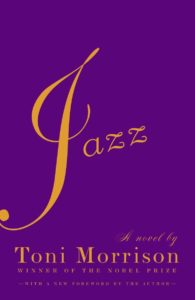
Jazz, Toni Morrison
Not a crime novel, per se, but definitely a powerhouse novel that features a central crime, so a crime novel for the purposes of this list. Set in the winter if 1926, Jazz follows beauty product salesman Joe Trace—who shoots his teenage lover to death. The grisly murder is just the capper—as the teen girl’s corpse is attacked by Joe’s wife at the funeral, and Morrison’s emotional, fear-soaked narrative hops back and forth in time, showcasing the stark realities of black city life while weaving in the music of the times with a honest, realistic portrayal of life in Harlem at the time. A moving, chaotic, and pulsing work of fiction that moves and flows like its namesake, Jazz is a masterful and confident work of fiction.
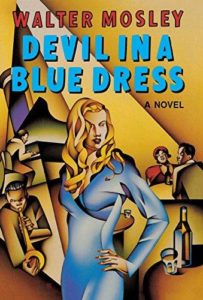
Devil in a Blue Dress, Walter Mosley
This classic noir novel is more tonally aligned with jazz than referential to the genre, with several scenes happening in secret jazz venues, infusing Easy Rawlins’ debut with a lively, dark, and menacing feel that not only evokes past masters of the jazz age, but carves out a place all its own. An essential read.
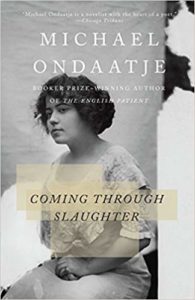
Coming Through Slaughter, Michael Ondaatje
Few will argue about New Orleans being the birthplace of jazz, and Ondaatje’s novel lives in those early days of New Orleans jazz, as he tells the fictionalized tale of Buddy Bolden, one of the first great trumpeters. Some might even argue he originated jazz itself. Lushly written and weaving through real events to craft a mysterious, undefined portrait of the legendary jazz artist, Ondaatje creates an unforgettable detective story with the unlikeliest of protagonists. Experimental, hard to forget, and brimming with voice and suspense, Coming Through Slaughter is the kind of book that sticks with you for a good long while.
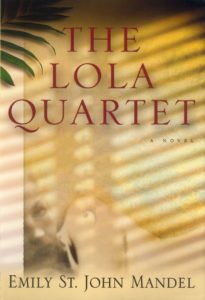
The Lola Quartet, Emily St. John Mandel
Disgraced ex-journalist Gavin Sasaki is facing a new career selling foreclosed properties for his sister in Florida—which is not appealing. But the move from New York south intrigues Gavin because of his sister’s recent discovery: a ten-year-old girl that bears a striking resemblance to Gavin, and shares a name with a girl Gavin once dated, who left suddenly around the time if his high school graduation. Digging back into his own past, including his days as part of the jazz ensemble “The Lola Quartet,” Gavin is focused on finding out the truth behind his potential daughter. Unfortunately, the truth ends up being much more dangerous and deadly than he anticipated. Mandel’s an expert wordsmith, and build suspense cleverly, making for a taut literary mystery.
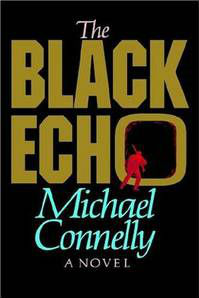
The Black Echo, Michael Connelly
Grizzled detective Harry Bosch, the star of Connelly’s long-running and best-selling series, is a jazz aficionado. While Pete Fernandez is just dipping his toe in the genre (and leans more toward indie and post-punk music), Bosch’s adventures could easily be accompanied by a jazz syllabus. You can count on at least three or four solid musical suggestions per novel, so I’d just suggest starting at the beginning—with Connelly’s taut, gritty The Black Echo.
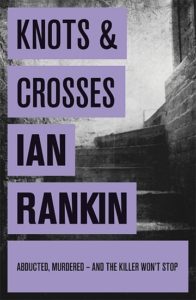
Knots and Crosses, Ian Rankin
Though Rankin’s Inspector Rebus has become more known for his affinity for artists like The Rolling Stones and Muddy Waters, the early Rebus novels feature the scruffy detective leaning more toward classical and jazz. But as Rankin got to explore his creation’s habits more, readers saw his musical tastes updated. Also, the introduction of younger characters later in the series opened the door to more modern acts, like Belle and Sebastian. Like the Bosch books, you’re well served starting at the beginning—with Rankin’s sharp, blue-collar, and evocative Knots and Crosses.

Rhode Island Red, Charlotte Carter
The first book in Carter’s acclaimed Nanette Hayes series, Red follows jazz sax player Hayes, a tall, statuesque woman bursting with style and a love for jazz. She makes a living performing around New York City, and tries to keep her head up despite the peaks and valleys of life, including a surprising breakup. But when she finds herself $60k richer, Nanette knows somethings up. When two dead bodies appear, she knows something’s bad. This novel is loaded with jazz—whether it’s hat tips to past maters, in-world references to making it as a jazz musician, or characters from every corner of the jazz world. A fun, compulsive read.
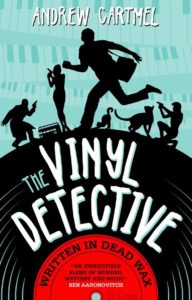
The Vinyl Detective, Andrew Cartmel
The title of this one is a smidge misleading, as the book’s protagonist isn’t actually a detective. He’s just a young London jazz fanatic, who spends most of his time digging through bargain record store bins searching for any finds being sold below market value. When he finds something good, he keeps it or sells it. But when a mysterious femme fatale shows up at his place, asking for him to find a record her boss recorded, our hero is intrigued. The album is a lost treasure—a legendary album never reissued on CD. What follows is a quirky, romantic, and engaging amateur sleuth caper that’s loaded with love for the genre—musical and literary—and a cast of memorable characters.
Honorable Mentions
Dark Passage, David Goodis
Though jazz isn’t central to this noir masterpiece, Goodis was a lifelong fan, and made a point of discussing it in the book – including nods to count Basie. If you haven’t read this one yet (for shame!), use jazz as an excuse to spend time with this classic.
Solo Hand, Bill Moody
Evan Horne’s a washed up pianist with a broken hand and fading career. When a singer from his playing days asks him to be the middleman in a blackmail payoff, Evan can’t say no. But, as these things often do, the case goes sour and the money vanishes. A crisp, fast-paced mystery by the versatile Moody that knows the ins and outs of the music industry from the vantage point of the hardworking session and behind-the-scenes players.
“The Night and the Music,” Lawrence Block
This story, from the Matt Scudder collection of the same name, is a thoughtful, brief tale that walks readers through the still-vibrant New York jazz scene in Greenwich Village, through the eyes of Block’s iconic and flawed private eye, Scudder. Set right after the events of the seminal A Long Line of Dead Men, this story’s moody, pensive mood makes for one of the standout collection’s more memorable tales.
* * *


